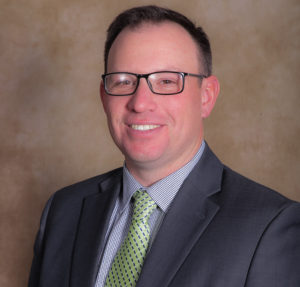
Swipe For More >
Sorghum Checkoff Newsletter – Winter 2019
The Sorghum Checkoff looks into the future of the industry and accepts a new strategic plan during their annual board meeting. USCP also revs up its engine to promote ethanol and welcome new board member, Adam Schindler.
Sorghum Revs up New Partnership to Promote Ethanol
With current international market realities, ethanol is critically important to the sorghum industry. With this in mind, the Sorghum Checkoff has revved up efforts to promote increased demand for E15 fuel, or 15 percent blends of ethanol.
The Sorghum Checkoff and Texas Grain Sorghum Board began their relationship with NASCAR driver Austin Wayne Self, his managing partner AM Racing and GO TEXAN in the fall of 2017, and the partnership has reached new heights this season. Self has become a devoted advocate for sorghum and has great passion for the brands and causes he represents on and off the track.
 “I plan to educate as many fans as possible about the benefits of sorghum and why it is a smart choice for ethanol, a clean-burning, high octane fuel with a strong connection to NASCAR,” Self said.
“I plan to educate as many fans as possible about the benefits of sorghum and why it is a smart choice for ethanol, a clean-burning, high octane fuel with a strong connection to NASCAR,” Self said.
E15 fuel has been used in NASCAR since 2011, and increased demand for E15 and higher blends of ethanol is key for continued sorghum farmer profitability. Typically, 20-30 percent of the U.S. sorghum crop is used to produce ethanol, which demonstrates the value of this market for sorghum growers.
John Duff, Sorghum Checkoff renewables program director, said NASCAR serves as a massive platform to reach consumers and tie ethanol back to the farm.
“NASCAR provides sorghum an important venue to connect with consumers on a new level,” he said. “Texas Motor Speedway has the potential to hold almost 200,000 fans at each race, not to mention the number of fans watching and following the races from their own homes or elsewhere, and we’ve already seen the results of this effort through increased interest in the crop and renewable fuels.”
“Fans have already reached out to both the Sorghum Checkoff and Austin Wayne Self’s team with inquiries about sorghum. Ultimately, it’s up to the consumer to choose E15 so that increased awareness among NASCAR fans is a great sign.”
Sorghum Checkoff Vice Chairman Jim Massey was able to attend the JAG Metals 350 race at the Texas Motor Speedway Nov. 2, 2018, as well as a race in Kansas where the Sorghum Checkoff sponsored NASCAR driver Matt Tifft in partnership with American Ethanol and Growth Energy. Massey said experiencing ethanol in action gave him a new appreciation for NASCAR’s direct link to consumers.
“I think today’s consumers are looking for products they can get behind, and sorghum fits the bill,” Massey said. “Austin does a tremendous job being an ambassador for his sponsors, including sorghum. He truly loves being sponsored by and speaking out for products and industries he can proudly hang his hat on.”
 Self made an appearance at the annual Sorghum Checkoff December board meeting in Lubbock, Texas, Dec. 10-12, 2018. Board members were able to ask questions and learn more about the sport’s appeal to consumers.
Self made an appearance at the annual Sorghum Checkoff December board meeting in Lubbock, Texas, Dec. 10-12, 2018. Board members were able to ask questions and learn more about the sport’s appeal to consumers.
“We want Austin to know the farmers he is representing out there on the track and have a personal connection with them,” Duff said. “It was a great opportunity for the board to hear directly from Austin about the tangible results of the work we are doing to educate everyone about the use of sorghum in ethanol.”
The partnership will continue into the 2019 season, and with two more races scheduled for March 29 and June 7 at Texas Motor Speedway, the Sorghum Checkoff will carry forward targeted messaging with Austin Wayne Self, AM Racing and GO TEXAN through the “What Fuels You?” campaign.
Ethanol has fueled over 12-million NASCAR miles in vehicles reaching speeds of up-to-200 miles per hour, and as the largest market for sorghum in the U.S., ethanol use will remain a strategic focus of the Sorghum Checkoff. Nurturing domestic markets, like ethanol, remains essential in times of trade uncertainty and variability of international marketplaces.
“Although not all ethanol is made from sorghum, a rising tide floats all ships, and anything that can increase demand and awareness for a product you grow, at the end of the day, is putting dollars in your pocket,” Massey added. “Creating consumer demand through NASCAR is a piece of the puzzle in fulfilling the Sorghum Checkoff’s mission to increase producer profitability and enhance the sorghum industry.”
Self will drive his No. 22 Chevrolet fueled by E15 into next season with Sorghum: The Smart Choice® boldly displayed across the side of the truck. What fuels you?
Schindler Joins Board of Directors, Replacing Fremark in At-Large Seat
 Adam Schindler of Reliance, South Dakota, was appointed to the Sorghum Checkoff board of directors in July and was sworn in at the annual board meeting in Lubbock, Texas, Dec. 10-12, 2018. Schindler will fill the at-large seat previously held by David Fremark of St. Lawrence, South Dakota.
Adam Schindler of Reliance, South Dakota, was appointed to the Sorghum Checkoff board of directors in July and was sworn in at the annual board meeting in Lubbock, Texas, Dec. 10-12, 2018. Schindler will fill the at-large seat previously held by David Fremark of St. Lawrence, South Dakota.
Schindler farms with his father and brother on their sixth generation family farm in South Dakota. Together they grow sorghum, soybeans, corn, sunflowers and spring and winter wheat and have a cow-calf and backgrounding operation. Schindler holds a bachelor’s degree in business economics from South Dakota State University and uses his education to aid in decision-making and risk management on their operation.
Schindler has been involved with Team Sorghum in many ways previously, including being a graduate of the inaugural Leadership Sorghum class, and expressed his desire to take his involvement to a new level as a board director.
“I am excited to be a part of such a nimble and diverse group that is passionate about representing the industry,” Schindler said. “Of all the boards and groups I have been involved with, this is the most passionate group from top to bottom, intern to board director.”
Schindler has interests in economics, trade and markets and feels he can use this in the future to contribute to the board. Schindler is also from the northern-most represented state on the board, and he hopes to communicate the issues farmers face from areas around him.
“I represent states who might have a different set of challenges than the larger [sorghum] producing states, and I feel I can communicate those for South Dakota and neighboring states,” Schindler said.
As Schindler stepped on, Fremark completed his six years of service to the board of directors, two of which he served as chairman. Fremark comes from a third-generation farm in South Dakota where he raises sorghum, corn, soybeans, spring and winter wheat and manages a feedyard and cow-calf operation with his wife and children.
Fremark reflected on the last six years by mentioning the impact his time on the board of directors has had on his perspective of the sorghum industry.
“I’m amazed at the quality of people we have working on behalf of sorghum, whether it be board members or staff people,” Fremark said. “It amazes me how much this group of people cares.”
“As a board member, you have to take time away from your operation, time to travel, and someone is doing the work at home while you’re away,” he said. “This team of board members is undoubtedly devoted and willing to go the extra mile with no concern as to who gets the credit.”
In addition to Schindler, Boyd Funk of Garden City, Kansas; Craig Poore of Alton, Kansas; and Jim Massey of Robstown, Texas; were all reappointed to their respective seats.
“As a representative of the U.S. sorghum farmer, the board of directors leads efforts to improve the industry for sorghum producers,” said Florentino Lopez, Sorghum Checkoff executive director. “The Sorghum Checkoff is blessed with a well-rounded, fervent group of individuals on the board who never settle for mediocrity and serve with great determination.”
Tim Lust, Sorghum Checkoff CEO, expressed his gratitude for the unwavering hard work and dedication of Fremark who has been on the board of directors since 2012.
“We extend our deepest appreciation to David who always brought a unique perspective and quick decision making to the table,” Lust said. “We also welcome Adam and are excited to see a new face with fresh ideas from South Dakota join us in our efforts on behalf of U.S. sorghum farmers.”
A Roadmap for the Future of U.S. Sorghum
After 10 years working on behalf of U.S. sorghum farmers, the Sorghum Checkoff set out to adopt and implement a new strategic plan in hopes of leading the way to a better, more profitable industry. Since 2008, the Sorghum Checkoff has enhanced its efforts in research, promotion and information to help producers yield greater financial return. Agriculture, however, is changing rapidly and becoming bigger, faster and more technology-driven. In order to keep sorghum relevant, the board of directors decided to embark on a journey to answer the emerging question, “Where do we go from here?”
The original strategic plan involved methods to increase general awareness of sorghum, establish a foundation and create a pipeline of technology for crop improvement. Now that those goals are moving forward, the board saw a need for greater focus on adding value through market development.
“For me, this strategic plan pulls together everything we’ve been trying to wrap our hands around for the last 10 years,” said Verity Ulibarri, Sorghum Checkoff chairwoman. “It gives us a new found focus on breaking down market development barriers we have discovered and a better idea of how to open those doors to benefit sorghum farmers in the future.”
After almost a year in the developmental process, the board of directors voted to accept the new strategic plan at the annual board meeting in Lubbock, Texas, Dec. 10-12, 2018. The new strategic plan will act as a roadmap for the future of U.S. sorghum by establishing a new mission, vision and purpose, as well as a new set of core values. The plan has six main goals, which the board analyzed and ranked according to priority level.
- Increase value recognition of U.S. sorghum by all customers with preferred qualities and quantities.
- Maximize producer potential for added profitability by developing U.S. sorghum producers who are informed about market opportunities and risk management tools.
- Identify and champion technology improvements and shared expertise that improve productivity.
- Develop a mechanism and knowledge for U.S. sorghum producers to capture potential value of marketing directly between buyers and sellers.
- Create and lead an industry-wide structure to engage communication between value-chain segments to facilitate timely and credible information, building opportunities and trust.
- Identify transportation and logistical challenges and apply innovative approaches to change the infrastructure dynamics of the sorghum market.
Chairwoman Ulibarri said she has a renewed optimism for the future of sorghum and looks forward to working with her fellow board members in creating a culture change.
“There has been a lot of back-and-forth for about a year on this new plan, and I am now confident it is something we can get behind,” Ulibarri said. “It’s something we are excited about because it gives us a strong direction for the next decade and encourages us to think outside the box.”
With a new strategic focus, the Sorghum Checkoff board of directors and staff will seek to provide leadership and be a catalyst for positive change for sorghum producers going forward. Return on investment for farmers will continue to be a primary consideration, and the Sorghum Checkoff will implement transparency to foster integrity and trust throughout the entire value-chain.
As the purpose states, the Sorghum Checkoff exists to do as a group what producers and industry stakeholders cannot do individually. Today, the economic picture for sorghum is bright with increased opportunity in demand and value, both domestically and abroad. With a new strategic plan in place, the Sorghum Checkoff will charge forward to increase shared value of the crop and build opportunities while also addressing challenges. The plan was developed as a living document to remain flexible as the sorghum industry and agriculture evolve over time.
David Fremark of St. Lawrence, South Dakota, a former chairman who completed his six years of service to the board in December, is encouraged by the new strategic plan and echoed Ulibarri’s sentiment.
“As I exit the board, I challenge the board members to make bold decisions, and I believe this new strategic plan will take us into the future,” Fremark said. “This group is one of the most passionate groups I have ever worked with, and I have faith they will continue to work tirelessly for the sorghum industry.”
Sorghum Industry Events:
January 28-31 – Leadership Sorghum Session 3
Washington, D.C.
Feb. 5-6 – NSP Risk Management Workshops
Garden City, Kansas & Perryton, Texas
Feb. 5-7 Kansas Sorghum Schools
Feb. 26-March 2 – Commodity Classic 2019
Orlando, Florida


